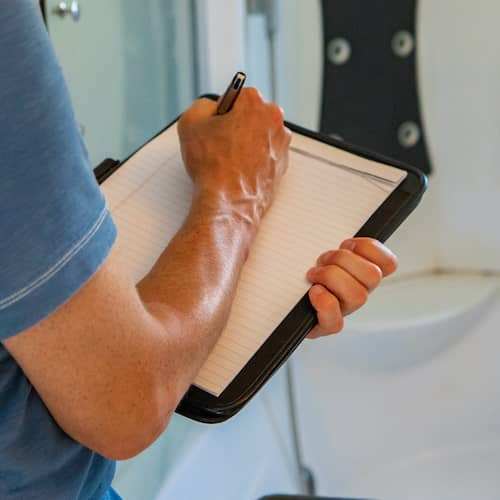FHA appraisal and inspection: Guidelines and requirements
Apr 8, 2024
•10-minute read

If you’re getting a Federal Housing Administration (FHA loan), you’ll need to get an appraisal in most cases. An FHA appraisal both establishes the value of the property and makes sure it’s safe for the homeowner or prospective homeowner.
We’ll explain exactly how the FHA appraisal process works, help you create an actionable checklist, talk about the aftermath and then discuss the next steps.
What is an FHA appraisal?
An FHA appraisal is a standard yet critical part in the home buying process for buyers using an FHA loan. With an FHA appraisal, a third party – unrelated to the buyer or seller – provides an estimate of the property’s market value. This ensures that lenders aren’t writing FHA loans for more than a property is worth.
What is an FHA loan?
Before we look more closely at how FHA appraisals work, let’s review exactly what an FHA loan is. FHA loans are government loans backed by the Federal Housing Administration which operates under the Department of Housing and Urban Development, or HUD. These types of home loans offer lower down payments and more flexible credit requirements than a conventional mortgage. However, qualifying for an FHA mortgage requires a borrower and property to meet certain criteria, and as mentioned above, a home must be appraised and inspected by an FHA-approved appraiser.
Like most government-backed loans, an FHA loan is a non-conforming loan, which means that it doesn’t meet the standards for a home purchase set by government-sponsored enterprises Fannie Mae and Freddie Mac.
FHA appraisal vs. home inspection
Two things that are commonly confused are an appraisal and an inspection. A home appraisal involves putting a value on a property and a basic safety inspection. It’s used to make sure that the loan-to-value ratio (LTV) after you buy the property represents an acceptable risk for the lender and the FHA as the mortgage investor.
By contrast, a home inspection is a thorough examination of a property you’re looking at buying to identify any potential issues so that you’ll know its condition and see if you’re personally comfortable with it. A home inspection includes checking all major systems and any appliances that may be included in the sale, as well as the home’s roof. If necessary, you can also get specialized inspections for things like septic systems and chimneys.
How do FHA appraisals work?
An FHA appraisal, and really any home appraisal, has two primary purposes: providing a value for your home and doing some basic safety inspections. There are some unique things that may happen with an FHA appraisal, but the process isn’t fundamentally different from an appraisal for any other mortgage.
What’s the purpose of an FHA appraisal?
We’ve established that FHA appraisals determine the current market value of the home and ensure the property meets basic safety standards – but why are these important to the home buying process? As it turns out, there are several reasons.
Provides protection for the lender
When you get an appraisal, the property is assigned a value to make sure that the lender isn’t making a loan for more than the property is worth. The reasoning for this is that if you default on the loan, your lender has to try to sell the property to get as much money as they can for the investors in your loan. No one goes in thinking that’s going to happen, but mortgage investors plan for worst-case scenarios.
Provides protection for the buyer
FHA appraisals also help protect the buyer. If you’re a home buyer, the valuation also prevents you from overpaying for your home. You’ll know exactly the current market value of the home, so you can be sure you’re paying a fair price on the property.
Ensures the property is move-in ready
The safety checks that are done as part of an FHA appraisal have to do with whether the property is move-in ready. If there are exposed floorboards or the utilities don’t work, that can be a health and safety issue. We’ll get into some FHA-specific standards a little bit below.
How do FHA appraisers assign a home value?
The primary function of an appraiser is to assign a fair market value to your home. To do this, they first take a look at the condition of your home as well as its amenities. After that inspection is complete, they look for comparable recent sales of similar properties, or “comps.”
“Similar” is a key word there. To be considered comparable, the properties need to resemble one another. Four-bedroom colonial homes are compared with other four-bedroom colonials. You wouldn’t compare it to a three-bedroom ranch property.
Comps are also typically judged against homes in the same – or very nearby – neighborhoods. There’s a little leeway in areas where homes are spaced farther apart, but that’s the exception rather than the rule. There are often up to three comparable properties used.
Based on this assessment, the appraiser puts all that information together and assigns a fair market value to the property.
What do FHA appraisers look for?
Beyond the value of the property, an appraiser has to be on alert for anything that affects the health and safety of the people who live in the home. They also have to be mindful of issues that could question the structural integrity of the property. They’re also looking for anything that would have a negative impact on normal use of the property or its ability to be marketed for future sale.
FHA appraisal guidelines for health and safety
From a health and safety perspective, an appraiser is looking for issues surrounding:
- Hazardous materials
- Toxic substances
- Mold
- Damaged or defective asbestos
- Urea-formaldehyde
- Problems with insulation
- Radon gas
Additionally, there are restrictions on the location of power lines, and the FHA doesn’t approve loans on properties within 300 feet of a tank containing more than 1,000 gallons of flammable or explosive material. If you’re in Hawaii, there are restrictions on getting loans for houses in certain lava flow zones.
FHA appraisal requirements for lead paint
The last thing specific to FHA mortgages is that there is a regulation related to homes built before January 1, 1979, when lead paint was used in construction. If there’s chipped or peeling paint, it needs to be remedied, with solutions including but not limited to one of the following:
- New paint
- Priming the area
- Treatment on wood surfaces
- Siding installation
- Other remedies that protect the surface from the elements
What happens after an FHA appraisal?
For the following sections, let’s take a look at the process through the eyes of a potential home owner named Casey. Every situation is different, but depending on the volume of work being handled by the appraisal management company, the difficulty of doing the appraisal and finding comparable properties, Casey should expect to have the appraisal report back within a few business days.
This section will go over the various scenarios that can come up during the home buying or refinancing process.
The home sale appraisal comes back low
For our first scenario, let’s assume you offered $380,000, had the offer accepted and the appraisal comes back at $360,000. Because the bank won’t approve a loan for more than the home is worth, there are two options:
Lower the sales price or renegotiate
If the seller is amenable, they might lower the price to what it appraises for, particularly if they’re motivated to move on. Otherwise, you can renegotiate. If you do this, you have to bring whatever the difference is between the appraised value and the final purchase price to the closing table in addition to your down payment and other closing costs.
You might be able to avoid the back-and-forth haggling by putting a clause in your purchase agreement that says you’ll pay a specific amount above the appraised value up to a certain dollar figure.
Walk away from the home
If the seller is unwilling to budge on the price or you can’t come to an agreement, you may be left with no choice but to walk away. If that happens, you’ll need to make sure that you have an appraisal contingency in your purchase agreement.
The appraisal contingency gives you the power to renegotiate and walk away if the appraisal comes back low. If you don’t have this contingency, you could lose your earnest money deposit. An earnest money deposit is an amount of money put in escrow representing a promise that you’re taking the final steps to secure financing to buy the property. In order to retain your deposit when you walk away, you must be moving on due to a contingency defined in the agreement.
The refinance appraisal comes back low
Now let’s say you own the home but are currently trying to refinance the existing mortgage. In this scenario, a low appraisal can have other implications.
If you’re refinancing your home, and the value comes in lower than what was estimated at the beginning of your loan process, you have a couple options. First, you can look at restructuring your loan. If you were planning on taking cash out and estimated your home’s value to be $200,000 and the value assigned by your appraisal was $175,000, that reduces your maximum loan amount from $160,000 to $140,000. This may mean taking less cash out, consolidating less debt or even bringing some funds to the closing table to make up the difference if the loan still provides a benefit.
If after reviewing the available options with your lender the loan is no longer a benefit to you, your loan will be denied and the loan process will end.
The appraiser requests further repairs
Now, let’s take a scenario in which you’ve fallen in love with a home, but it needs some electrical work done in order to be brought up to code and the appraiser is requiring the repairs be completed for the transaction to close. Ideally, you can negotiate to have the seller pay for the repairs. If that’s not feasible, a buyer is allowed to pay for the repairs as well.
When should repairs be completed?
In general, repairs that are about the safety and livability of the property will have to be completed before the transaction closes. In certain cases, you can work with your mortgage lender to complete the process post-close via an escrow holdback.
In an escrow holdback, a portion of the loan funds are set aside to pay for repairs that can be completed later, but don’t impact safety. Examples include sod, gutters, deck, driveway and pest treatment.
The appraisal comes back at or higher than the expected amount
If the appraisal comes back at least as high as you agreed to pay in your purchase agreement or how much you’re refinancing for, this is the best possible scenario. You just move forward with your transaction.
FHA inspection checklist
Home inspectors will look at the major components of a home to ensure everything is in working order. A home inspector will examine a home’s:
- Roof and gutters
- Attic and insulation
- Walls and ceilings
- Windows and doors
- Floors
- Foundation
- Appliances
- HVAC system
- Plumbing and electrical systems
FHA appraisal and inspection requirements
The thought of having an FHA appraisal conducted might seem stressful. The good news is you’re not required to do a whole lot on the day of the appraisal. The appraiser does the hard work.
Preparing your home for an appraisal or inspection
The one thing you’re going to want to really make sure of is that they have access to the areas they need to check out. It doesn’t hurt to tidy up your house. Your home should never be appraised based on cleanliness, but there should be clear walkways to get between rooms and such.
If you have pets who don’t handle strangers well, consider leaving them in their crate or having a trusted friend or family member watch them for a few hours.
FAQs about FHA appraisals
Let’s close this out by answering a few of the most common questions surrounding FHA appraisals and inspections.
How long is an FHA appraisal good for?
In general, FHA appraisals are good for up to 180 days. In some instances, an appraiser can recertify the value if they agree to do so before the original appraisal expires.
What won’t pass an FHA inspection?
The FHA is most concerned with issues that affect the safety and livability of the property. If anything major happens that could affect the safety or health of an occupant, the appraisal is failed, and the issues need to be rectified before the mortgage can close. This could be anything from exposed floorboards, missing handrails to chipping paint in a house built before January 1, 1979.
How much does an FHA home appraisal cost?
An FHA home appraisal is ordered by the lender and paid for by the buyer. The cost can vary quite a bit and depends on a variety of factors such as the level of demand, how far an appraiser would have to travel to get to your location, how big the house is, the number of units and how much land there is to cover.
The cost of an appraisal can either be paid for as part of your deposit with a lender or your closing costs, but the fee is typically in the range of $500 – $2,000.
How long does it take after an appraisal to close on an FHA loan?
The time it takes to close on a house after an appraisal varies. Usually, the FHA loan process takes anywhere between 30 – 60 days. However, appraisal problems can prolong this timeline. The FHA allows up to 120 days for necessary repairs to be made.
The bottom line: FHA appraisals protect both lenders and home buyers
Like all real estate appraisals, the aim of an FHA appraisal is to establish the safety of a home as well as its value. This is different from a home inspection which doesn’t assign a value but does a deep dive on the condition of the home and potential issues.
In addition to assessing your home’s value by comparing it to similar properties, the FHA appraisal process includes a safety check for hazards like mold, utilities not working and lead paint among other things. If you’re looking to prepare for an FHA appraisal, the most important thing to remember is that all areas of the house should be easily accessible.
If an appraisal comes back low, you can renegotiate with the seller or walk away. If you do the latter, be sure you have an appraisal contingency so you can get your earnest money deposit back.
If you’re ready to get started, you can start an application today with Rocket Mortgage®.
Kevin Graham
Kevin Graham is a Senior Writer for Rocket. He specializes in mortgage qualification, economics and personal finance topics. Kevin has passed the MLO SAFE exam given to mortgage bankers and takes continuing education courses. As someone with cerebral palsy spastic quadriplegia that requires the use of a wheelchair, he also takes on articles around modifying your home for physical challenges and smart home tech. He has a BA in Journalism from Oakland University.
Related resources

4-minute read
FHA mortgage insurance removal: A how-to guide
All FHA loans require you to pay up-front and ongoing mortgage insurance premiums (MIP). Learn when and how you can remove MIP from your mortgage payment.
Read more

4-minute read
FHA loan limits: How much can you borrow in 2026?
FHA loan limits are designed to cap how much you can borrow with an FHA loan. Learn more about how these loan limits work and what the limits are for 2026.
Read more

5-minute read
FHA multifamily loans: A complete guide
If you're interested in buying a home with multiple units and becoming a landlord, an FHA multifamily loan can help. Learn more about how these loans work.
Read more